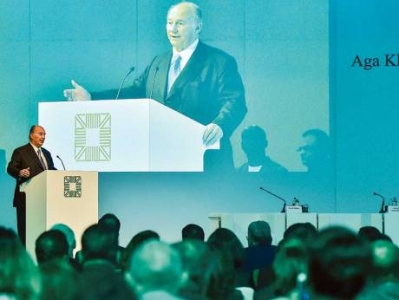Aga Khan warns climate change will affect Muslim world 2016-11-07
Dubai: Climate change threatens to wipe out areas of the Islamic world within two decades, the spiritual leader of around 25 million Muslims said on Saturday.
Many of the world’s Muslims live in a “band of land” under threat from natural disasters caused by climate change, the Aga Khan told a hushed audience gathered at a Dubai hotel. “We’re beginning to see in many parts of the Muslim world … how global warming is beginning to create situations where life is at risk, where it was not at risk before.”
“We’re seeing villages are being wiped away by earthquakes, by landslides, by avalanches, we’re seeing people moving to dangerous areas in modern environments.” And with more people living in cities than ever before, many end up living in dangerous, unsafe conditions, he added.
The 79-year-old spiritual leader told the audience, made up mostly of urban planners and architects gathered from around the world, that they can help.
“I would ask you to try to bring this issue forward so that we address it in good time,” he said. “I see these crises of change as being badly predicted.”
More work needs to be done to educate people living in threatened areas — and more research done to better predict future crises, he added.
The Aga Khan, who was born in Geneva but today spends much of his time in Paris, is the current leader in a centuries-long dynasty which claims spiritual authority over Ismaili Muslims.
Many members of the Ismaili sect are scattered across Pakistan and India, while others live in Central Asia and the West.
As part of his role, the Aga Khan runs a non-profit Dh2.3 billion development network which aims to boost developing countries.
One of these arms, the Aga Khan Award for Architecture, seeks to promote buildings and structures that benefit Muslim communities. The award, which started in the late 1970s, hands out Dh3.67 million every three years to the architects and clients behind the winning structures.
The six winners of this award cycle include a mosque and social space in Bangladesh, a children’s library in China, an urban park in Denmark, a university building in Lebanon, and a bridge in Iran. The architects and backers of the six winning projects will be awarded at a ceremony held on Sunday at a historic fort in Al Ain.
The current batch of winning projects shows how Muslim communities have spread across the world, said Mohammad Al Asad, a member of the award’s steering committee. The committee is a de facto board of trustees chaired by the Aga Khan.
“The world is changing drastically, [and] we have become more interested in issues relating to infrastructure, urbanism, to multiculturalism, to the presence of Muslim communities in diasporas,” the Jordan-based urban planner said.
And despite a critical need, regional conflicts that have caused millions to flee Muslim-majority countries, few useful structures and buildings had been designed to help them, Al Asad added.
“You have large numbers of people being displaced, and a number of projects were submitted that addressed this issue, but I don’t think the jury felt they were of the quality that [they wanted],” he said.
Who is the Aga Khan and what does he do?
As well as being the spiritual leader of millions of Ismaili Muslims, the current Aga Khan has for five decades lead a huge charitable foundation, the Aga Khan Development Network. The network is a group of private development agencies aims to improve living conditions and opportunities, with a focus on central and south Asia and sub-Saharan Africa.
With an annual budget of Dh2.3 billion, the foundation claims to work for the common good of everyone, regardless of their gender, origin or religion.
One of the foundation’s arms is the Aga Khan Award for Architecture. Every three years, the award gives out Dh3.67 million in prize money to the architects and backers of buildings and structures around the world that benefit Muslim communities.
The award, considered one of the most generous competitions in architecture, has been running for close to four decades.
- 8405 reads
 Ismaili.NET - Heritage F.I.E.L.D.
Ismaili.NET - Heritage F.I.E.L.D.